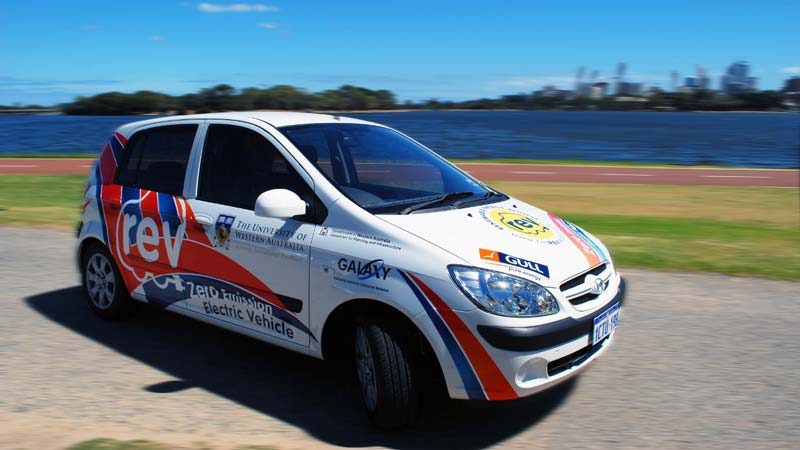A new lease on life is being given to a 12-year-old Hyundai Getz originally bought – and converted to electric – by the University of Western Australia (UWA) in 2008 as part of its Renewable Energy Vehicle Project (REV).
First converted in 2008 under the supervision of REV director and ex-BMW researcher Professor Thomas Braunl, the Getz is undergoing a full replacement of its low voltage electrical architecture.
Originally converted using a 144 volt architecture, the economical four-seater has a 13kWh battery pack that delivers up to 80km driving range.
The initial conversion involved removing not only the engine but also the fuel tank, radiator and exhust to make way for a 28kWh electric motor, electric vacuum pump, electric power steering pump and electric air-con unit.
While the new electrical system won’t increase range or charging speed, it will give the vehicle another 10 years on the road.
“The upgrade won’t change the range in our Getz, so we’re still looking at 80km on a full charge, which takes six hours if you plug it into an AC outlet,” REV director Professor Thomas Braunl was quoted as saying by The West.
“The upgrade will give us another 10 years on the road because electric cars have a longer life expectancy compared to petrol or diesel.”
Braunl, who authored the recently and belatedly published WA electric vehicle charging report, was also involved in the Australian-first WA electric vehicle trial conducted from 2010-2012.
With a sparse number of electric vehicles available commercially in Australia at the time, participants in this trial requested something larger than a converted Getz.
The chosen vehicle for the trial was a Ford Focus which for regulatory reasons was converted by WA-based EV Works, which was a step up from the Getz with the capacity to “fast charge” its 23kWh battery pack in three hours and able to drive up to 130km on a single charge.
Of course, things have come a long way in the last 10 years, says Braunl. “You can buy a Tesla these days with a 600km range,” he was quoted as saying by The West.
More importantly though, Braunl says with a transition to electric vehicles now gradually taking hold in Australia, supporting EV drivers with charging infrastructure is paramount.
“The next step is to make electric cars cheaper and increase availability of charging stations, especially in WA where distances between towns can be significant — and this needs to be funded by government.”

Bridie Schmidt is associate editor for The Driven, sister site of Renew Economy. She has been writing about electric vehicles since 2018, and has a keen interest in the role that zero-emissions transport has to play in sustainability. She has participated in podcasts such as Download This Show with Marc Fennell and Shirtloads of Science with Karl Kruszelnicki and is co-organiser of the Northern Rivers Electric Vehicle Forum. Bridie also owns a Tesla Model Y and has it available for hire on evee.com.au.

